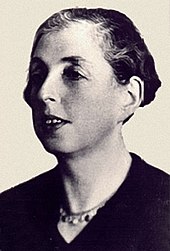Edith Lindenberg
Edith Lindenberg (born February 26, 1887 in Berlin as Edith Anna Meyer; † September 24, 1944 in the Theresienstadt ghetto ) was politically active in the fight against National Socialism .
Life
Lindenberg grew up in Berlin in a Jewish family. She completed her medical studies at the University of Freiburg i. Br. , Where she also met her future husband Hans Lindenberg. The move to Rostock, which was essential for professional reasons, followed, where they finally married in 1911. Lindenberg primarily supported her husband in his practice and looked after their daughter.
In the course of the First World War , the extent of which she was shaped, she began to become politically active. Edith Lindenberg's interest in politics began in 1918; she became a co-founder of the Rostock branch of the left-liberal DDP . The revision of the abortion paragraph §218 was the focus of their work. In 1922 she was involved in founding the Rostock Peace Group. In addition to organizing peace events, Edith Lindenberg took part in the peace congress in Berlin in 1924.
These activities came to an abrupt end when the National Socialists came to power . As a Jew, Lindenberg was forced to abstain from public life in 1933, whereupon the couple limited themselves to Jewish social work. They managed to send their daughter to England. In 1944 both spouses were murdered in the Theresienstadt ghetto.
Web links
- Rostock under the swastika: Stolperstein Hans and Edith Lindenberg
Individual evidence
- ^ Karl Heinz Jahnke: Resistance against the Nazi dictatorship in Mecklenburg. Preface. www.mv-taschenbuch.de, February 7, 2012, archived from the original on February 28, 2014 ; accessed on March 22, 2020 .
- ^ Karl Heinz Jahnke: Resistance against the Nazi dictatorship in Mecklenburg: in memory of the women and men who were murdered between 1933 and 1945 , Büro + Service GmbH, 2006, p. 141
- ↑ Women who move Mecklenburg-Western Pomerania (accessed on February 7, 2012; PDF; 8.9 MB)
| personal data | |
|---|---|
| SURNAME | Lindenberg, Edith |
| BRIEF DESCRIPTION | German-Jewish activist against National Socialism |
| DATE OF BIRTH | February 26, 1887 |
| PLACE OF BIRTH | Berlin |
| DATE OF DEATH | September 24, 1944 |
| Place of death | Theresienstadt ghetto |
